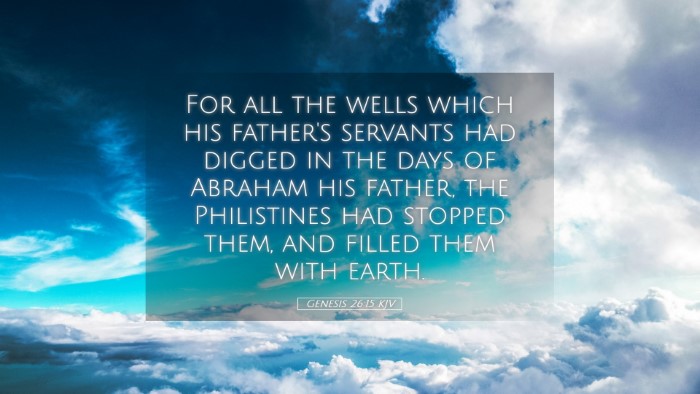Commentary on Genesis 26:15
Verse: Genesis 26:15 (KJV) - "For all the wells which his father’s servants had digged in the days of Abraham his father, the Philistines had stopped them, and filled them with earth."
Introduction
The passage in Genesis 26:15 presents a significant moment in the life of Isaac, illustrating the conflict over resources and the challenges faced by God's chosen people. In this commentary, we will explore the insights provided by esteemed commentators such as Matthew Henry, Albert Barnes, and Adam Clarke, delving into the implications of this verse for understanding spiritual and historical contexts.
Contextual Background
This verse captures a period during which Isaac was dwelling in Gerar—a land occupied by the Philistines. The cessation of access to water from the wells dug by Abraham highlights the broader narrative of conflict and promise associated with Isaac's lineage. Such conflicts serve as a reflection of the spiritual battles faced by God's people throughout history.
Historical Significance
As noted by Albert Barnes, the act of the Philistines stopping the wells illustrates an ongoing tension with the descendants of Abraham. These wells represented much more than just physical sustenance; they were deeply tied to God's covenant promises to Abraham and his descendants. To obstruct these wells was to challenge the very foundation of God's promise to provide for His people.
Theological Implications
From a theological perspective, Genesis 26:15 also highlights the notion of divine inheritance. Matthew Henry remarks that the Philistines’ actions served to provoke Isaac and teach him reliance on God rather than on material resources. This encounter encourages believers to recognize that even in times of opposition and deprivation, God's provision and His promises remain steadfast.
Spiritual Warfare
The filling of the wells by the Philistines can be interpreted as an act of spiritual warfare. Adam Clarke offers insight into how this act symbolizes the efforts of adversaries to quench the blessings that God provides. Believers are reminded that in the face of opposition, God's faithfulness is unyielding, and He continuously desires to move His people to deeper reliance on Him.
Practical Applications
This verse has practical implications for pastors and theologians called to help their congregations navigate challenges. The example of Isaac demonstrates the importance of perseverance and faith in the face of adversity. Leaders are encouraged to draw from this passage when guiding their communities through trials, thereby fostering a spirit of hope and resilience.
Encouragement during Trials
When confronting the "wells" that have been clogged in our lives—be they personal struggles, church conflicts, or societal challenges—believers are called to trust in the God who sustains. As Isaac's situation reminds us, restoration can come not just through reclaiming lost resources but also through the deeper understanding of God's purpose and provision.
Conclusion
Genesis 26:15 serves as a poignant reminder of the trials that accompany faith, heritage, and spiritual inheritance. It highlights the need for vigilance against forces that would seek to undermine our spiritual resources. Through the reflections provided by Henry, Barnes, and Clarke, we see that God’s covenant remains unbroken, and His faithfulness prevails through every challenge we might face. This passage encourages believers to look beyond immediate circumstances and trust in the overarching narrative of God's providence.
References
- Henry, Matthew. Matthew Henry's Commentary on the Whole Bible.
- Barnes, Albert. Barnes' Notes on the Bible.
- Clarke, Adam. Adam Clarke's Commentary on the Bible.


